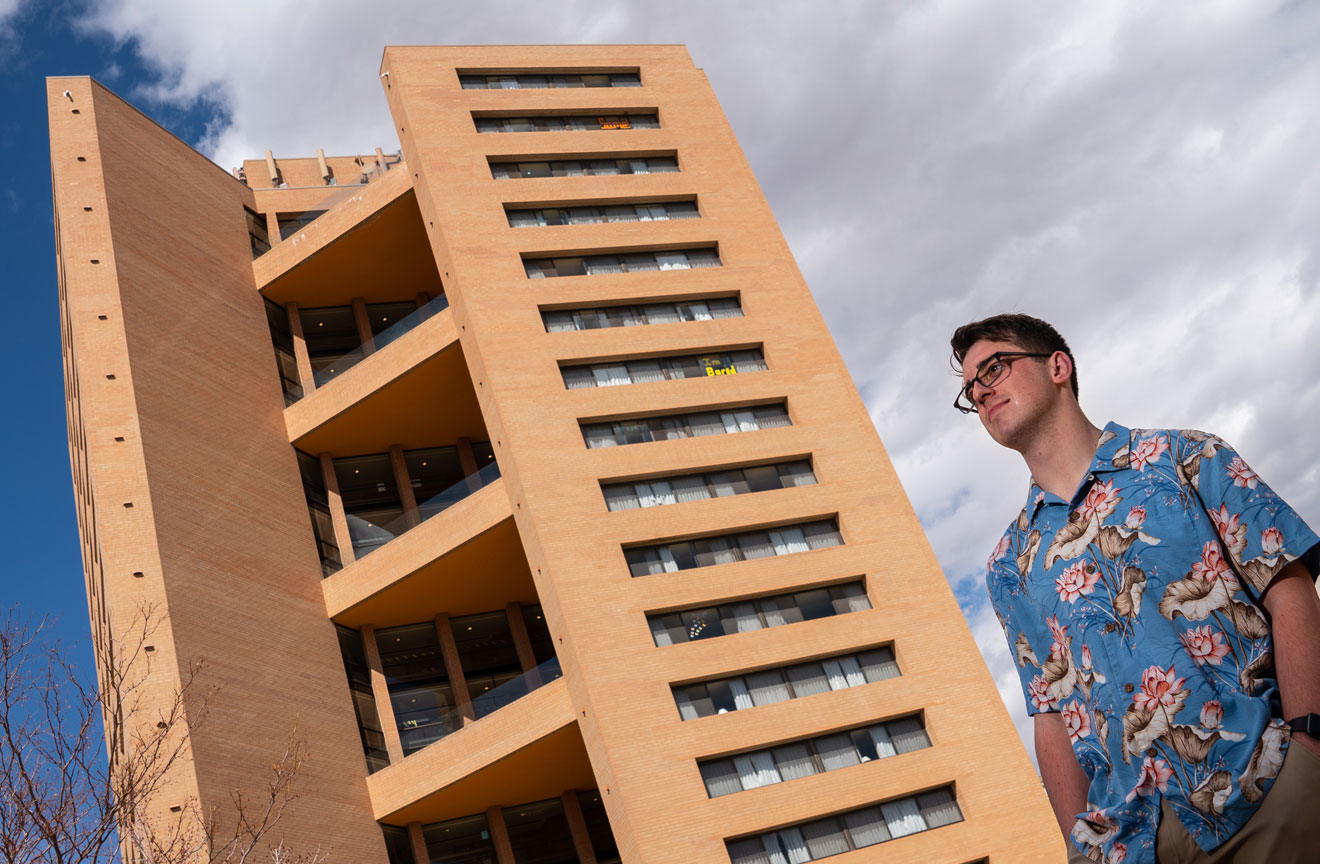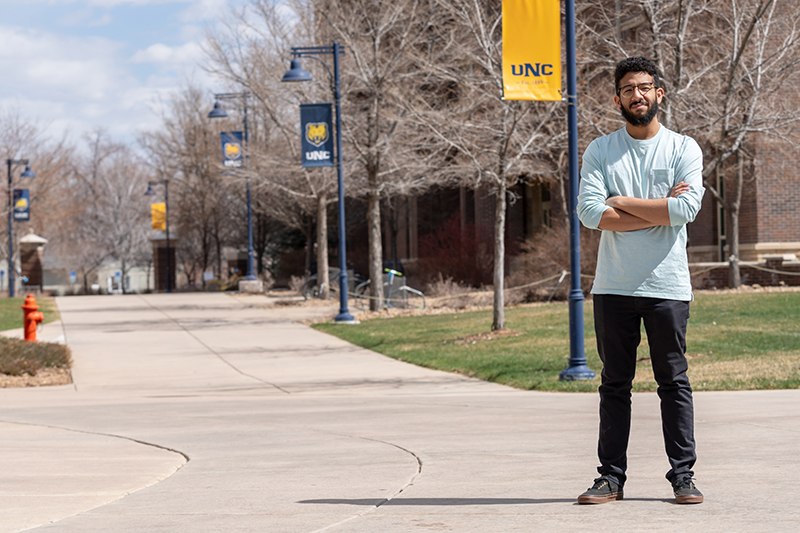
University of Northern Colorado student Carson Pecot on the school’s campus in Greeley on March 31, 2020. Photos by Steve Peterson
University of Northern Colorado student Carson Pecot on the school’s campus in Greeley on March 31, 2020. Photos by Steve Peterson
From the 17th floor of Lawrenson Hall on the University of Northern Colorado (UNC) campus in Greeley, Carson Pecot looks down at maybe 100 cars parked in lots that would normally hold many times more. The 22-year-old junior might see one or two students during his daily run, or when he heads to the dining hall for a meal to go.
The COVID-19 pandemic has disrupted life around the world, including at Colorado’s colleges, which have mostly shut down, allowing only a limited number of people on campus in an attempt to stem the spread of the coronavirus.
Like most of the state’s students, Pecot is continuing his coursework remotely. Students living in residence halls have been encouraged to move out and finish the remainder of the school year at home.
Pecot chose to stay on campus for financial reasons. He works for the university as the resident hall association president and, he said, “I knew I probably wouldn’t be able to get another job at this time. It was the best option I had.”
For many students, “the residence halls are their homes and the dining hall provides their meals,” University of Colorado (CU) Boulder Chancellor Philip P. DiStefano observed during a mid-March meeting with the university system’s board of regents. [Editor’s note: the author of this story writes the CU faculty and staff newsletter.] DiStefano added that most students living in dormitories at CU Boulder could not afford to move off campus and pay for meals, and some international students would have to return to countries where the disease is more pervasive than it is in the United States, the Daily Camera in Boulder reported. (This comment was made weeks before the United States recorded the most confirmed COVID-19 cases in the world.)
As of March 31, more than 90% of the 8,598 students living in Boulder campus dormitories had chosen to move out, according to CU Boulder spokesperson Deborah Méndez Wilson. Yet other students may not have a choice about where to live or where they get their next meal.
A survey of more than 65,000 students conducted in the fall of 2018 at four Denver institutions—Metropolitan State University of Denver, Community College of Denver, CU Denver and the University of Denver—found that 18% of the 3,011 people who responded had experienced homelessness during the previous year. The report, by the Hope Center for College, Community, and Justice at Pennsylvania’s Temple University, also found that 40% of respondents had experienced food insecurity in the month before they answered the survey.
The Hope Center’s survey found that rates of basic-needs insecurity are higher for students at two-year colleges than those attending four-year colleges. Rates of insecurity also are higher for historically marginalized students, including African Americans, students identifying as LGBTQ and students who do not receive financial support from parents or guardians.
Now, as Colorado cities and the state take steps to increase social distancing to limit exposure to COVID-19, the risks of being food- or shelter-insecure have increased. While it is too soon to know the number of college students who are impacted by the crisis, it’s likely that many have been harmed by campus and business closures around the state.
Just over 59% of Colorado college students work while attending school in order to pay for essentials like food, housing, transportation and other monthly expenses, according to a 2017 report by Abodo, an apartment search site. To cover rising tuition costs, some students turn to loans or scholarships.
Many of those students find jobs in restaurants or bars because the industry offers flexible hours that accommodate their class schedules. But thousands of employees in the industry were laid off or had their hours reduced after Gov. Jared Polis first ordered the closure of dine-in services statewide effective March 17, and then a “stay at home” order on March 26.
Anthony Rodriguez, 21, worked his last shift as a server at Red Lobster in Greeley on March 15. The UNC junior had previously worked as many as 31 hours per week.
“I wasn’t too worried when Red Lobster said they would be closed for about a month,” said Rodriguez, “but when the state and city announced the lockdown, I got a little worried.”
He has a savings cushion, but the lease on his apartment, which he shares with three roommates, is up at the end of the semester. He’s concerned that rent for another place could cost hundreds of dollars more. He’s also concerned that his hours might be reduced when he returns to work at the restaurant.
“Everyone is going to want their hours, but since (classes) are online, everyone is going to have a lot more hours to work and there will be more competition for those hours,” Rodriguez said. “That is my main stressor now: will I be able to make enough money?”

University of Northern Colorado student Anthony Rodriguez on the school’s campus in Greeley on March 31, 2020.
Colleges and universities in the state offer a variety of programs for students who experience unexpected crises or expenses. Sara Goldrick-Rab, the founding director of the Hope Center, suggests that students affected by college closures or other emergencies contact student affairs officials to ask for help. “Ask for options, emergency aid, etc. Do not be shy in seeking support. Use your college’s resources before turning to community resources, as those are already taxed,” she told U.S. News & World Report.
Western Colorado University provides assistance through its Western CARES (Critical Aid Relief Emergency Support) Fund, and Colorado Mesa University has a Home Loan State Bank Hardship Program. Both provide students with some relief when a crisis strikes.
Students facing unanticipated financial emergencies in general or as a result of the COVID-19 pandemic at CU Denver can seek help from the Loving Lynx Fund. Students can apply for help with medical or dental emergencies, accidents or the need for temporary housing. Whether they receive financial support through the program or not, all students are referred to other community resources, said Sarah Erickson, a spokesperson for CU Denver, in an email.
In addition, the CU Denver Student and Community Counseling Center is providing online mental health counseling services, and medical professionals and counselors at the Health Center at Auraria are available for “coronavirus consultations” at no charge.
A few days before Arapahoe Community College (ACC) converted to remote, online learning on March 30, Dean of Students Javon Brame and Vice President for Student Affairs Lisa Matye Edwards stood outside a closed campus, handing iPads to students who needed them. A plan is also in place to provide laptops to any students without access to a computer. ACC has also been proactively working to meet the needs of students who are housing- or food-insecure.
“We created an intervention and resource guide for faculty and staff, and we are making phone calls to all of our students enrolled this semester, asking them what type of support they need during this time,” said Brame.
ACC partners with Arapahoe and Douglas counties and the Tri-County Health Department to provide aid to students, “because we know we don’t have the resources to do it by ourselves,” Brame said. A case manager at ACC works directly with students in crisis to guide them toward appropriate community agencies.
Because the college’s food pantry has been closed, the college is sending grocery gift cards to students who have previously accessed the pantry during the semester. The college also has an emergency fund as well as other financial assistance for students experiencing homelessness, and is providing online or telehealth counseling for students experiencing increased anxiety.
Anticipating that the needs of students will become more severe, representatives of universities and colleges around the state signed a letter seeking more federal financial support. The letter was delivered to Colorado’s congressional delegation on March 20.
The appeal seeks more funding for technology implementation as campuses are challenged by the shift to remote teaching. It also requests access to zero-interest refinancing and zero-interest loans, and other financial resources. The state’s institutions expect refunds and credits for room and board to students could total as much as $100 million.
The signees, 20 representatives of Colorado higher-ed institutions, also are specifically requesting funding to shore up the programs that provide emergency aid to students.
“The impact of COVID-19 on our students and universities has been profound. While every student has experienced challenges during this uncertain period, there are students who are most impacted by efforts to move to remote instruction or campus closures,” the letter says.
“We are concerned these students, who may be low-income, homeless, or foster youth, will struggle to meet their basic needs, which include housing, transportation, food, and medical care, without direct on-campus support. It is critical the federal government help institutions ensure our most vulnerable students are not harmed as a result of efforts to protect them from COVID-19.”
While the details of the $2 trillion federal stimulus legislation are still be learned, some advocates for student loan forgiveness were left underwhelmed by the resulting bill that passed.
To address the needs of students who currently can’t afford to pay for nutritious food, the state of Colorado is encouraging institutions of higher education to direct students to the federal Supplemental Nutrition Assistance Program (SNAP), which provides benefits to eligible low-income households to supplement food budgets, The Denver Post reported.
At least two million at-risk students around the nation who were potentially eligible for food aid through SNAP were not receiving benefits in 2016, according to a 2018 U.S. Government Accountability Office report. And in Colorado, only six of 10 eligible Coloradans are enrolled in SNAP, according to a 2018 Colorado Blueprint to End Hunger report. The report notes that low enrollment rates in the states are caused by a number of factors: a complicated enrollment process, lack of awareness about the programs and services, stigma surrounding the programs, transportation barriers and scarcity of outreach and enrollment support.
The Community College of Aurora was the first higher education institution to partner with the Colorado Department of Human Services for a federal grant providing support services to SNAP recipients attending the college. More than 500 students from the college apply for SNAP benefits each year, said Janel Highfill, associate vice president of workforce, partnerships and resource development.
The project to help more students receive SNAP benefits was launched prior to the coronavirus crisis. “We got funding out to 33 eligible students and will stay in close touch with them to support their successful completion of the semester,” Highfill said.
The college sent out a survey last week to gauge the needs of students, but so far, concerns have focused primarily on the transition to online learning. Highfill said the college has obtained 75 refurbished computers from the nonprofit PCs for People, and will hand them out to students to help address technology needs.
Another way institutions of higher education have addressed student hunger is to build their own food pantries. While many pantry operations have been suspended because of the coronavirus crisis, the organizations are helping students obtain food in other ways.
At UNC, for instance, the Bear Pantry had provided grab-and-go bags to students struggling to buy food. The pantry now is providing meals to students through the Bear Share meal-swipe donation program. Students experiencing food insecurity can load meals on their student identification cards and redeem them at a dining hall, according to the UNC website.
A CU Denver food bank was closed earlier in March to limit the number of people on campus. Now, the university has partnered with Food Bank of the Rockies to provide a mobile food pantry for students. The mobile pantry will hand out boxes of supplies to CU Denver students on select Tuesdays until the crisis subsides.

A sign in a dormitory room window on the University of Northern Colorado campus in Greeley on March 31, 2020.